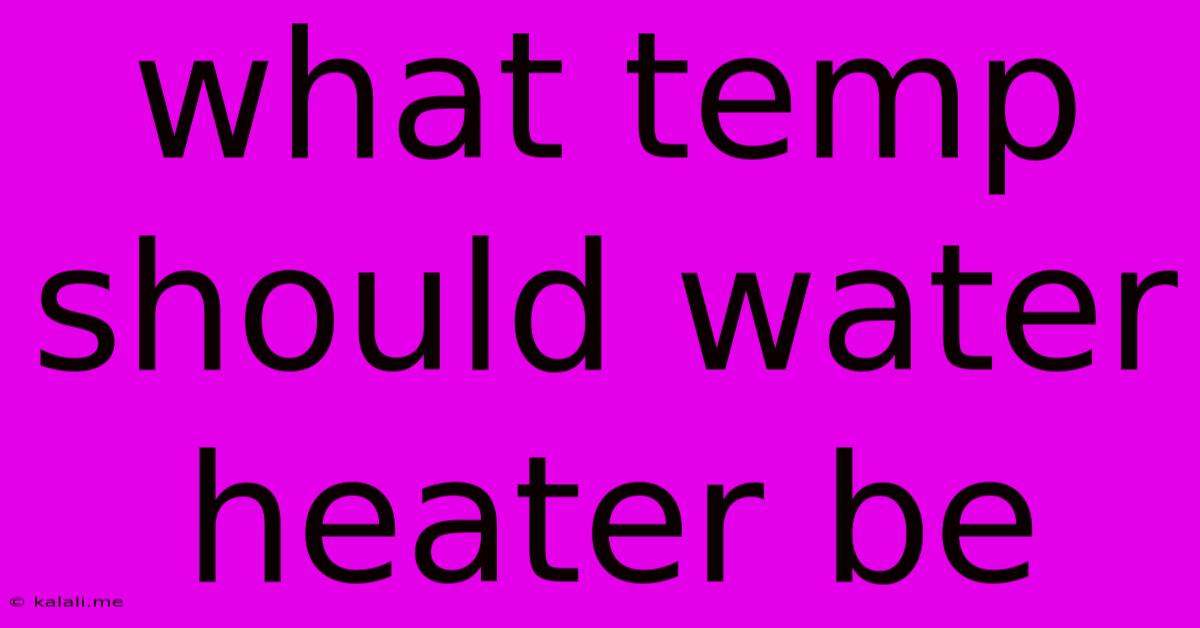What Temp Should Water Heater Be
Kalali
May 21, 2025 · 3 min read

Table of Contents
What Temp Should Your Water Heater Be Set At? A Guide to Safety and Savings
Finding the perfect water heater temperature is a balancing act between safety and energy efficiency. Too hot, and you risk scalding; too cold, and you'll be shivering in the shower. This guide will help you determine the ideal water heater temperature for your home, considering safety regulations, energy conservation, and personal preferences.
Why Water Heater Temperature Matters:
The temperature of your water heater directly impacts your household's safety and your energy bills. A higher temperature means using more energy to heat the water. Conversely, a lower temperature might not be hot enough for comfortable showering or dishwashing, leading to longer showers and increased water usage. Let's delve into the optimal settings:
The Recommended Water Heater Temperature: 120°F (49°C)
The U.S. Department of Energy and most plumbing experts recommend setting your water heater to 120°F (49°C). This temperature is hot enough to kill most harmful bacteria, including Legionella, the bacteria responsible for Legionnaires' disease, without posing a significant scalding risk. This temperature is also a sweet spot for energy efficiency, preventing excessive energy waste.
Risks of Too High a Water Heater Temperature:
- Scalding: Higher temperatures significantly increase the risk of accidental burns, particularly for children and the elderly. Even a brief exposure to extremely hot water can cause severe injuries.
- Increased Energy Consumption: Maintaining a higher temperature necessitates more energy, translating to higher utility bills. Your water heater will work harder and potentially wear out faster.
- Equipment Damage: Excessively high temperatures can damage your water heater components and shorten its lifespan.
Risks of Too Low a Water Heater Temperature:
- Bacterial Growth: Lower temperatures may not be hot enough to effectively eliminate harmful bacteria, posing a potential health risk.
- Inconveniently Cold Water: You might find yourself needing to run the water for longer periods to reach a comfortable temperature, leading to wasted water and energy.
- Inefficient Cleaning: Hot water is essential for effective cleaning of dishes and laundry. Cold water may not adequately remove grime and bacteria.
Adjusting Your Water Heater Temperature:
The process of adjusting your water heater temperature varies slightly depending on the type of water heater you have (electric, gas, tankless). Consult your water heater's manual for specific instructions. Most water heaters have a dial or digital display that allows you to set the desired temperature. Remember to always turn off the power or gas supply before making any adjustments.
Beyond the Temperature Setting: Additional Safety Measures
While setting the right temperature is crucial, consider these additional safety measures to further minimize the risk of scalding:
- Install Anti-Scald Devices: These devices, often installed on showerheads and faucets, mix cold water with hot water to prevent sudden temperature surges.
- Supervise Children: Always supervise young children when they are in the bathroom or near hot water sources.
- Check Water Temperature Before Entering: Before showering or bathing, test the water temperature with your hand or elbow to ensure it is comfortable.
By setting your water heater to the recommended 120°F (49°C) and implementing these additional safety precautions, you can enjoy the comfort of hot water while minimizing risks and saving energy. Remember, regular maintenance of your water heater is also key to ensuring its longevity and safety.
Latest Posts
Latest Posts
-
Bank 1 And Bank 2 O2 Sensor
May 21, 2025
-
Walk From London Euston To St Pancras
May 21, 2025
-
Can I Take Chocolate Into Australia
May 21, 2025
-
Can I Pray Witr After Tahajjud
May 21, 2025
-
Clash Of Clans How To Start Over
May 21, 2025
Related Post
Thank you for visiting our website which covers about What Temp Should Water Heater Be . We hope the information provided has been useful to you. Feel free to contact us if you have any questions or need further assistance. See you next time and don't miss to bookmark.